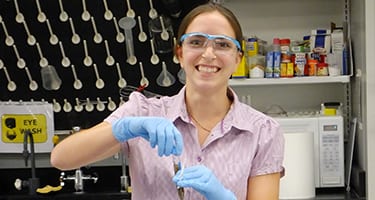News
BTI Welcomes New Teaching Lab Coordinator
In her new position she will coordinate the teacher training institutes, develop and ship plant science experiment kits to classrooms nationwide and provide support for the Tompkins Cortland Community College biology courses taught at BTI.
Sims is gearing up for the two teacher institutes that the Education and Outreach department will host in July, entitled Curriculum Development Projects in Plant Biology and Bioenergy & Bioproducts.
“I’m really looking forward to the teachers coming,” said Sims. “I would like to have a positive impact for science teachers who are looking to incorporate plant science into their classrooms in innovative ways that are going to be meaningful for their students and for them as educators.”
Sims brings with her a background in nonprofit work addressing issues of sustainability. Before joining BTI she was the director of outreach at the Community Science Institute, an Ithaca nonprofit that provides state-certified water quality testing for volunteer stream monitoring programs and private wells. Earlier in her career, she worked at Ithaca Carshare and completed the environmental studies program at Ithaca College. She has also volunteered with the Finger Lakes Permaculture Institute since 2009 and serves on its board.
She puts these permaculture principles into action at her own home in Enfield with her husband Zach, where they grow raspberries, pawpaws and hazelnuts in forest gardens.
One of Sims’ main goals in her new position is to develop tools that can improve science literacy for school children and to help them integrate a deeper understanding of science into their worldview.
“I think it’s really important for students to be able to apply the science concepts that they’re learning to actual goings-on in the real world,” she said. She gives the example of the issues surrounding the generation of biodiesel from algae. “Just because you can understand the chemistry of how biodiesel is made doesn’t mean necessarily that you know about the social and political context.”
Sims believes that providing interdisciplinary science education resources to teachers is the best way to enact these changes.
“If you’re able to have an impact on a group of teachers, then they can multiply that in the classroom. And if they’re successful, then their students can even multiply the effect,” she said. “That’s what I would like to see happen.”


